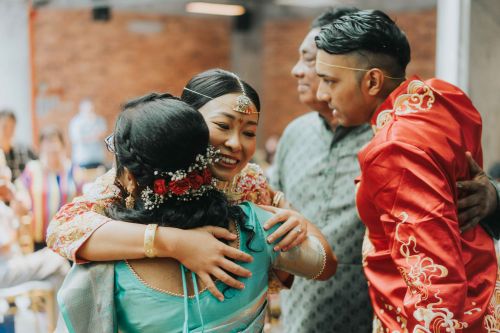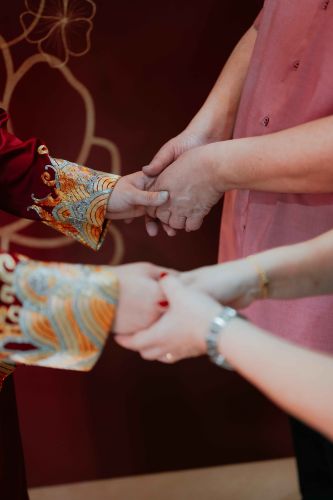A Bonding Experience.
For many, wedding planning might seem like a special day for just the couple. However, in reality, a wedding is more than just about the bride and groom; it represents the union and coming together of two families. Wedding planning it’s also an incredible opportunity to grow closer to:
Your parents –the people who shaped your growth, guided you with their wisdom and were often your role models.


There’s a lot to consider in wedding planning, and everything feels like a new experience, which can be quite stressful. Add the pressure from those around you, and it can quickly become overwhelming. In this process, the involvement of parents is crucial—they are not only supporters but also the bonds that connect the two families. By including parents in the wedding planning, you can strengthen the emotional ties between the two families, showcasing the power and warmth of family. Every family dynamic is different. In the following, let’s explore how to involve your parents in the wedding planning process to create a more meaningful and familial wedding experience.
1. Set Clear Expectations and Boundaries
Before diving into the details, have a conversation with your parents about what role they’d like to play. Some parents might want to be deeply involved, while others may prefer to stay in the background. By setting these expectations early, you give everyone a clear sense of their role and prevent anyone from feeling left out or overwhelmed.
Some parents may have strong opinions about specific aspects of the wedding, such as the venue, the guest list, or even the colour scheme. While their input is valuable, it’s crucial to set boundaries on what decisions are non-negotiable and which ones can be discussed or altered. Establishing boundaries and aligning expectations early can ensure that everyone is on the same page and feels comfortable with their level of involvement. Also, the most important! To avoid awkward or stressful situations later.


2. Collaborate on the Budget
The first step in collaborating on the budget is to have an open and honest conversation about who will be contributing financially to the wedding. In many cultures, parents are expected to contribute to the wedding expenses, but this can vary greatly depending on the family dynamic and personal circumstances. It’s important to establish realistic financial boundaries early on.
When collaborating on the budget, be transparent about your desires for the wedding while also being mindful of what’s financially feasible. You may have your heart set on a luxurious venue or a specific vendor, but your budget may not allow for those choices, collaborating with your parents ensures that everyone has a realistic understanding of what can be achieved within the available funds.
The next step is to create a detailed budget plan. This plan should cover every aspect of the wedding—from the venue and catering to flowers, photography, and favours. Break down the costs for each category, making sure to leave room for unexpected expenses.
Regular check-ins with your parents ensure that everyone is still comfortable with how the money is being spent and allow you to make adjustments as necessary.


3. Delegate Tasks Based on Their Strengths
Wedding planning involves a lot of tasks—some big, some small, and it’s essential to determine who will take on each responsibility. First, understand what your parents are good at or passionate about. Every parent has their own set of skills and interests, and tapping into these can help you assign tasks that they will be excited to take on.
- Hospitality-Oriented & Friendly Parents: If your parents have strong hosting abilities and enjoy making every guest feel welcome, they might be perfect for overseeing guest experiences. They could handle things like greeting guests, managing reception flow, dealing with guest requests etc.
- Creative Parents: If your parents have a flair for design or love of DIY projects, they might enjoy taking on responsibilities like contributing ideas for wedding favours design, choosing floral arrangements, or even helping with the wedding décor.
- Organized & Detail-Oriented Parents: If your parents are naturally organized and keen on details, they might be great at managing the guest list, and keeping track of RSVPs.
Once you’ve identified the strengths of your parents, it’s important to be clear about the tasks and expectations associated with each responsibility. Your trust in them is important, as one of the best ways to make your parents feel involved is by trusting them with important aspects of the wedding planning. Even if things don’t go exactly as planned, let them handle it and be there to offer support, rather than stepping in and taking over.


4. Plan Fun, Stress-Free Activities
Wedding planning can sometimes feel like a pressure cooker. It’s important to keep things light-hearted and fun throughout the process. One way to reduce stress and bring joy to the journey is by planning and incorporating fun, stress-free activities with your parents. This helps in bonding, taking a break from the planning chaos, and creating meaningful memories.
- Tasting party: Plan a fun tasting session to sample potential caterers or menu items. Invite a few close family members (if applicable), have a selection of foods to taste, and let everyone enjoy the moment. The goal is more about enjoying the food and spending time together.
- DIY session: If your parents enjoy crafting, set aside a day to work on DIY wedding projects together. Working together on these elements can be both fun and therapeutic. Gather your supplies, put on some music, and let creativity take over.
- Plan a getaway: Wedding planning can get stressful, so it’s important to take some time for relaxation. Plan a short getaway with your parents to recharge and you’ll return to your planning feeling refreshed and energized.
Have a Wedding Planning Celebration: Set a date for a celebration, once you’ve accomplished a significant milestone in your wedding planning, treat yourself and your parents to a mini celebration. You can plan a dinner at their favourite restaurant, this is also one of the ways to appreciate their efforts put in during your wedding planning.


5. Be Transparent About Decision-Making:
Involving your parents in the process can be a wonderful bonding experience, but it can also introduce challenges when it comes to balancing opinions, desires, and expectations. One of the most effective ways to ensure a smooth planning experience is by being transparent about your decision-making. Transparency fosters trust, reduces misunderstandings, and keeps everyone involved on the same page.
Explain the reason behind your decisions! Whenever you make decisions about the wedding, whether big or small, explain the reasoning behind them. This doesn’t mean they need to justify every choice you make, but offering insight into your thought process helps your parents understand where you’re coming from and why you’re making certain choices. If there are family traditions or preferences that influence your decisions, share that context with your parents. When your parents express concerns or disagreements, listen carefully. Don’t interrupt or dismiss their feelings. Instead, acknowledge their concerns, share your perspective, and look for common ground.


6. Document the process
You can start with a wedding planning journal. It is a wonderful way to capture the day-to-day progress and thoughts throughout the planning process. For example, you can snap these occasions into your wedding journal: venue visit, dress fitting, DIY crafting, tasting session etc. Whether you opt for a physical notebook, digital document, website, or social media content, having a place to jot down your feelings, ideas, and key decisions will help you remember the journey.
Then, set it as a surprise session during your dinner reception. You can play the digital document, and express your thoughts and gratitude. Don’t be afraid to express personal moments, whether it’s an exciting conversation with your parents, a stressful planning day, or a fun moment you shared with your parents. It serves as a heartwarming reminder of all the love, excitement, and effort that went into your wedding day


7. Express Gratitude and Acknowledge
One of the most meaningful ways to honour this journey is by acknowledging the love and support of your parents. From the moment you start planning your big day, your parents are likely right there beside you, offering guidance, encouragement, and even taking on significant responsibilities. You can show your appreciation and acknowledge through these ways:
- A Thank-You Speech: During the reception, you might dedicate a portion of your speech to thank your parents for everything they’ve done. Share some personal anecdotes or funny moments from the planning process, and let your guests know just how grateful you are for your parents’ contributions.
- Special Acknowledgements During the Ceremony: Consider including a special acknowledgement of your parents during your wedding ceremony (like: playing the digital wedding journal), this moment will show them how much you value their presence in your life.
Personal Gifts: Present your parents with meaningful gifts during the wedding ceremony, such as personalized jewellery, framed family photos, or a custom keepsake. These gifts serve as a tangible reminder of your love and gratitude to their support.


Wedding planning is much more than just organizing a celebration. It’s about bringing together two families and creating an experience that reflects love, unity, and shared joy. From setting clear expectations to acknowledging your parents’ contributions. It is important to show them that you value their support, whether they’re helping with decisions or simply offering emotional encouragement. These gestures not only help alleviate stress but also ensure that everyone feels involved and respected throughout the journey.


We believe that the keys to making your wedding planning a bonding experience are building a foundation of trust, empathy, and clear communication. In the end, wedding planning is a shared experience that should be about more than just the final event. It’s about the connections and bonds formed along the way. Practice all these and you’ll create a wedding experience that is both joyful and meaningful for everyone involved.


